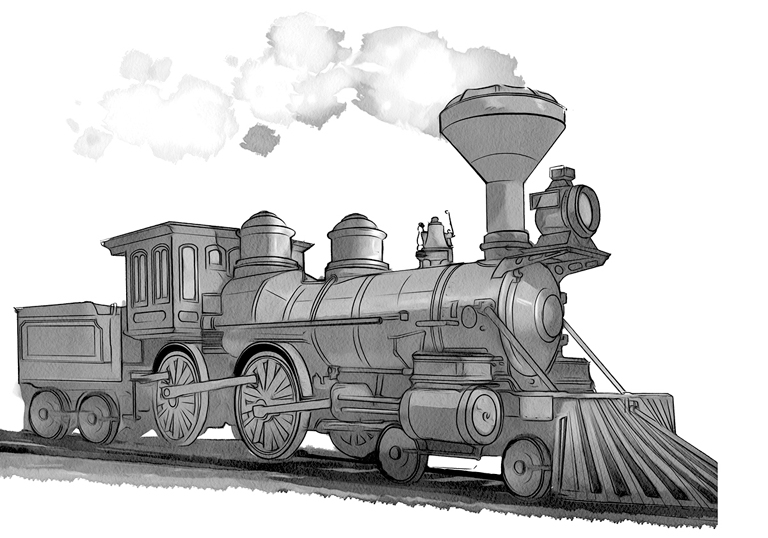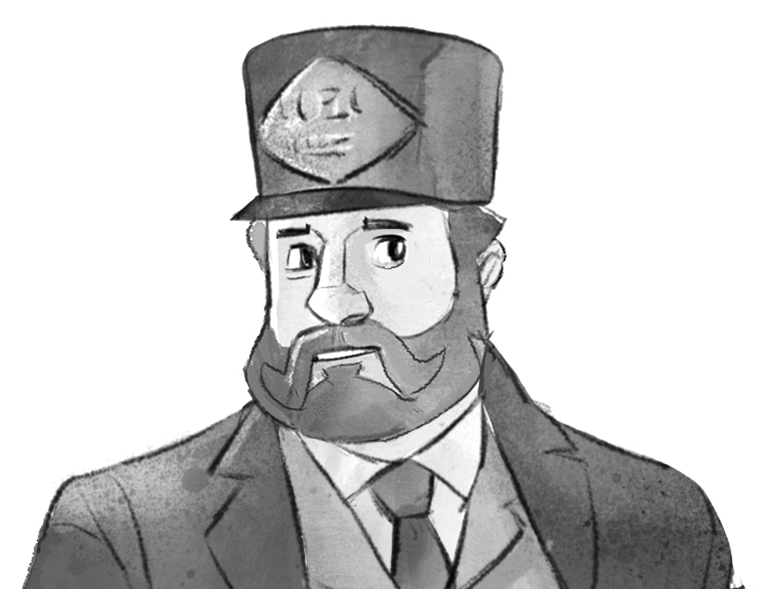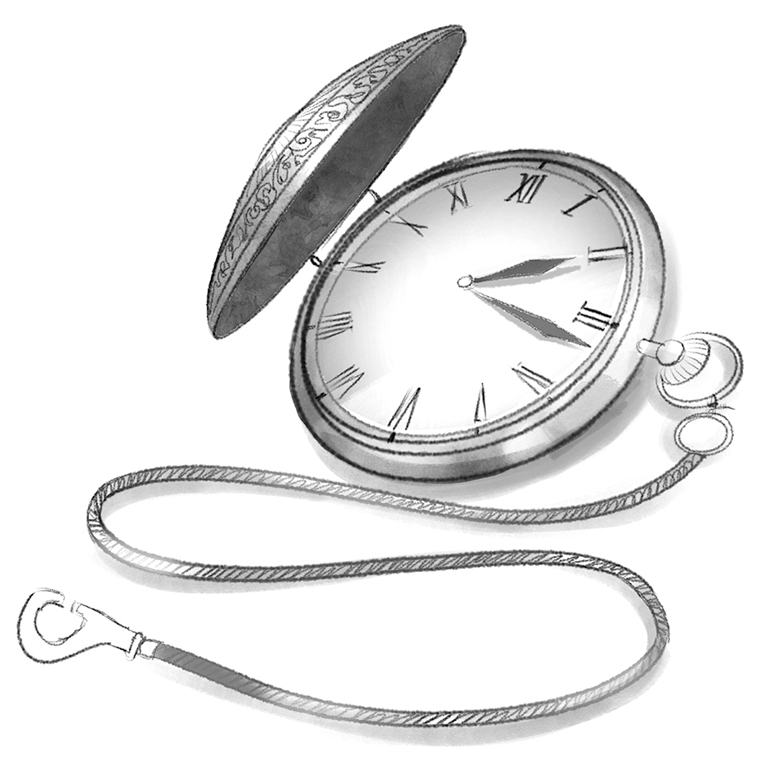The Horseman

“Eugene could be wrong,” Patrick said. “He might have mixed up the date.”
Beth took the letter out of Patrick’s hands. She folded it up. Then she put it back in the envelope. “When was the last time Eugene made a mistake?” she asked.
Patrick thought Beth was right. Eugene’s memory could be trusted. He probably hadn’t made a mistake since kindergarten.
He took the envelope from Beth. He put it back in his jacket pocket.
“Maybe Eugene and the Pinkerton agents will catch Jesse James,” Patrick said. “Then he won’t rob this train.”
“The letter said ‘gather evidence,’ not ‘capture,’ ” Beth said. “Eugene can’t change major events of history. The Imagination Station won’t let him.”
“But the Imagination Station isn’t working properly,” Patrick said. “Anything could happen.”
Patrick leaned forward and glanced across the aisle at Leonard. He didn’t want the boy to overhear them.
Leonard had shifted over to the window seat. His forehead was pressed against the glass. He seemed to be intently watching something.
Patrick noticed movement at the front end of the car. Mr. Alford and Miss Cookson were entering the passenger car. They began to walk down the aisle.
Patrick nudged Beth. “Here comes the conductor and Miss Cookson,” he said. “Do we tell them about Jesse James?”
“I don’t think they would believe us,” Beth said.

Miss Cookson walked primly down the aisle. Her small purse was clutched in her hand. She stood in the aisle next to the cousins.
Mr. Alford followed her. He was so tall that his head nearly bumped the ceiling lamps. Every few steps he had to duck to miss one.
He came to the back of the train. He scanned the orphan section.
“Which girl is our latecomer?” Mr. Alford asked.
Beth raised her hand. “Here, Mr. Conductor,” she said. “I’m sorry I had to jump on board.”
Mr. Alford said kindly, “That’s all right, miss.” He patted Beth on the shoulder. “You’re an orphan, after all. You probably didn’t know any better.”
Miss Cookson handed Beth a train ticket. “Mr. Alford has been very generous,” she said. “Please remember that and follow his example.”
Phew, Patrick thought. We missed the tongue-lashing.
Mr. Alford took Beth’s ticket and his hole puncher. He poked a little star in the ticket. He handed it back to Beth.

Beth said thank you.
Mr. Alford took out his gold pocket watch. “Ten minutes till we reach Des Arc, Missouri,” he said.
Leonard turned his attention away from the window. “Mr. Alford, there’s a fellow on a horse following us,” he said. His voice was loud with excitement. “I think you should look.”
Mr. Alford leaned over and rested his hand on the seat’s back. “By golly,” he said. “There is a man coming along the tracks. He’s working that horse mighty hard.”
The people with window seats on Leonard’s side looked out the window too.
Beth whispered to Patrick, “Do you think it’s Jesse James?”
“I don’t know,” Patrick said. “Let’s get a better look.”

Beth noticed the train was slowing down. The Missouri hills were steep on this section of the line. A man on a horse could gain ground on it.
Patrick crossed the aisle. He moved to an empty set of seats.
Beth followed Patrick and looked out the window.
The man was wearing a brown hat and a white shirt. His horse was gray and white.
The engineer blew the train’s whistle. There was one long whistle followed by three short blows.
The man on horseback took off his hat. He waved it in a wide arc.
Mr. Alford turned from the window. He quickly moved away from Leonard’s seat.
“What did those whistles mean?” Leonard asked the conductor.
“That whistle pattern means we’re coming to a stop,” Mr. Alford said. “I’ve got to see to the first-class guests in the sleeper car.”
Mr. Alford headed out the front door.
Beth watched the conductor leave and then said softly, “It’s not Jesse James.”
“Is too,” Patrick said. “Who else would be out there?”
“I don’t know. But this horseman isn’t trying to hide,” Beth said. “He wants to be seen.”
She rolled her eyes. “Any robber with a brain would plan a surprise,” Beth said. “He would wear a mask and attack at night.”
Leonard’s face suddenly appeared at the window next to theirs. “Or ruin up the tracks,” the orphan said. “That’s what Jesse James did in Iowa.”
“What happened then?” she asked.
“The train’s engine fell over sideways,” Leonard said. “Then someone blew up the safe. Everyone’s money was stolen.”
Beth gasped.
Patrick said, “You’re making it up. Stuff like that happens only on TV.”
“On TV?” Leonard asked.
“It’s not important,” Beth said. “Did you read about him in the Tribune?”
Leonard nodded. He pulled a small piece of newsprint out of his knickers pocket. “There,” he said. He held it out.
Patrick took the newsprint and skimmed the article.
He said to Beth, “Jesse James and gang robbed a stagecoach. That was two weeks ago. A few months ago he robbed a train in Iowa. And in Kentucky, he robbed a bank.”
“What about the Pinkerton detectives?” Beth asked. “Why can’t they stop him?”
Leonard said, “Because gangs are smart. No one can catch the Whyos either.” He took the paper back. “They call the Jesse James gang ‘brazen’ and ‘bold.’”

The train’s whistle blew several long blasts.
Mr. Alford opened the back door. Cold air came in with the conductor.
He hurried up the aisle. “There’s a fire at the Des Arc station,” Mr. Alford said. “Everyone stay seated.”
No one did. The passengers all rushed to the windows. Leonard moved to the opposite side of the train.
“Another train is on fire,” Leonard said. “One of the cargo cars has flames as high as the treetops.”
Beth looked out the window at the horseman. He was almost at the station too.
She felt a chill. And it wasn’t because of the cold.
